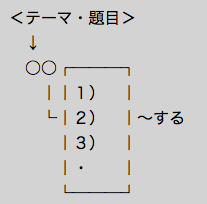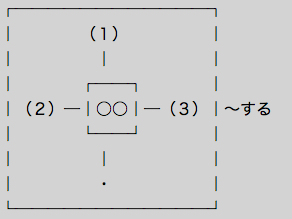What is the difference between にかんして and について? Example usage would be much appreciated!
-
Someone has written a paper on this: bit.ly/jLVZMS (Japanese)– Louis WaweruCommented Jun 10, 2011 at 11:59
-
That paper has an English explanation at the end, but it's hard to understand. I didn't even try reading the other 16 pages.– nevan kingCommented Jun 10, 2011 at 12:15
-
Yes, the Japanese is way above my level. If you have a good understanding of grammatical terms, the abstract (on the last page for some reason) gives two cases where the 648 example sentences distinguish に関して and について.– Louis WaweruCommented Jun 10, 2011 at 12:27
-
5Maybe we can ask about に対して to add some fun– repecmpsCommented Jun 10, 2011 at 13:12
4 Answers
I found the answer on this website to be incredibly useful and explained the difference in a very understandable way: http://nihon5ch.net/contents/bbs-study/old/mie-bbs.cgi?s=86
However, I've quickly attempted to do a rough translation of the important parts of the answer so that even beginners who see this question can understand the difference. If able, I highly recommend reading the original post, however.
Usage Context/Literary Differences
When studying Japanese, 「〜について/〜についての」is studied before 「〜に関する/関して」. That is to say, 「〜について」is often used as a basic phrase in conversation.
In the case of foreign language study, when you translate into your own language and the words come out the same the difference can be difficult to understand. However, there is the following difference. 「〜について」→ Expression used often in conversation. 「〜に関して」→ Expression often used in written language.
About The Differences In Usage
1) The meaning of「○○について~する」

With verbs like 「話す」and 「考える」, for the reason of stating the topic or theme about which you intend to speak or think about first, 「について話す/考える」is used. In other words, if you were to say 「自分の夢について話す」, it would be because you are going to talk about things like 1) What you want to be, 2) Why you want to be that, 3) How you're going to become what you want to be.
2) The meaning of 「○○に関して〜する」
The meaning of 「関する」is "to be related", "to have a connection". Therefore, the expression 「○○に関して〜する」is used with the meaning of "In relation/connection to ○○ I/He/It will 〜". That is to say, much like 「について」it displays the theme or topic, however it is not restricted to just THAT topic. Of course 「○○に関して〜する」indicates a direct relation to ○○, however, it indicates strongly that related and connected topics will also be addressed.

If you picture the above description as an image, I think the difference can be understood easily.
If you were to say「日本語について研究する」, it would have the theme of 「日本語」and be restricted to content such as 「日本語の単語」、「日本語の文法」and 「日本語の発音」.
However, If you were to say 「日本語に関して研究する」, 「日本語」would be centered on, however it would point out that it is not "restricted" and areas peripheral to the topic are included.
For example, things like:
- 「日本語を使った劇」
- 「日本語で書かれた小説」
So, if you were going to be writing about Japanese festivals (What is interesting, what type of festivals you like, etc), you normally say "日本のお祭りについて書く". If however, you were to say 「日本のお祭りに関して書く」, it gives the impression that you will be centering around festivals but also touching on related topics. Additionally, it gives a much "stiffer" impression than "について".
Sentence Patterns
(A)「~について + Predicate」(Predicate:Verb、Noun + Verb)
- 日本の文化について 話す
- 日本の文化について 考える
- 日本の文化について 知識を深める
(B)「~についての + Noun」
- 日本の文化についての話 を聞く
- 日本の文化についての考え を話す
(C)「~に関して + Predicate」
- 日本の文化に関して 勉強する
(D)「~に関する + Noun」
- 日本の文化に関する論文 を読む
In many contexts, they can both be translated to English as variations of "related", "as for" etc, but there are some differences...
As far as I know (and could find from different Japanese grammar sources), a few of the nuances are:
について means you are setting (in a restrictive manner) a theme/topic. It is preceded by something you are talking/thinking/writing about and often followed by a verb expressing such an action.
日本語について研究する → "I study (about) the Japanese language" with a notion of topic restriction (e.g. Japanese grammar, Japanese vocabulary etc.)
に関して does not have that nuance of topic restriction, rather that of a relation (関係/関連) between the part that precedes and the part that follows. It is therefore used with a wider range of verbs.
日本語に関して研究する → "I study things (closely) related to the Japanese language" with a notion of topic relation (e.g. plays or novels that are written in Japanese).
Usage: について is more common conversational Japanese. に関して is slightly more often found in writing.
Grammar: Although について and に関して are both followed by a predicate (verb or verbal noun), their "adjectival" variations (form attached to a noun) are different (についての and に関する):
日本の文化について話す ▶ 日本の文化についての話を聞く
日本の文化に関して勉強する ▶ 日本の文化に関する論文を読む
Also, I believe you would never see に関して ending a sentence, whereas it could be the case with について (and the copula omitted):
「これから歴史の授業が始まります。今日は江戸時代について。」"History class will now start. Today's topic is the Edo era." [this example is my own, so please take it with some reserve]
Edit: a large part of the above examples are taken from the very link mentioned by phirru below: it is indeed a nice page on the topic. However, I found the explanations a lot more confusing than in my other grammar books (and decided not to go for a full translation).
-
@Rolf: I saw the edit you suggested, but this functionality should not be used to change the content. When you have a suggestion to improve the content of a post, please post a comment on it instead of using the “edit” link. Commented Jun 11, 2011 at 1:07
-
@Tsuyoshi: I am a bit confused about your comment (especially since it is addressed to Rolf, not me)... but on the off chance you are referring to my edit above: the only reason I posted this update as a post edit and not as a comment is that, at the time, I still did not have enough reputation pts to comment (including on my own posts, which is a bit silly)– DaveCommented Jun 11, 2011 at 18:35
-
@Dave: I was not referring to your edit. Rolf suggested some edit, but it was substantial change to part of your answer. Therefore I recommended him to use a comment instead of “suggested edit” functionality. I am not sure if you can access this page, but this is the edit he suggested. Commented Jun 11, 2011 at 19:23
-
@Tsuyoshi: I see. Now this makes a lot more sense. Yes, I can access that page, but for some reason, SA doesn't otherwise display any mention (that I can see) that such an edit was proposed and refused, hence my confusion.– DaveCommented Jun 12, 2011 at 1:29
-
Sorry for confusing you. I have once been exactly in the same position (someone suggested an edit to my post, other user rejected and posted a comment about it, I read the comment and was confused), and I was aware of the possibility of the confusion, but I did not know how to avoid it. Commented Jun 12, 2011 at 1:41
I think it's just important to look at the kanjis to get the meaning.
「に関する」means "to have a link with, to be related to".
「に就いて」means "concerning".
Those two meanings are different: one is concrete (ついて) one is meta (関して). Either you literally discuss the contents (ついて) either you discuss what revolves around (関して).
Examples:
GNU GPLに関する質問: Questions that are related to the GNU/GPL. (Can I sell GPL software? are there compatible licences? (subject is not the GPL))
GNU GPLについての質問: Questions on the GNU/GPL (Is the GPL legal? Can GPL be translated? (subject is the GPL))
-
i like this short sweet and simple explanation (though the rest are good too =D)– PacerierCommented Jun 24, 2011 at 11:41
に関して => Related to, in relation to について => Concerning, along, under, per
この問題に関して質問を受ける Be questioned in relation with this problem
この点に関しての米国の見方は、各国が必要とする行動には差異があるということです。 The view of the United States on this point is that there is differentiation in what countries need to do
(人)の学校での一日について話し合う Discuss someone's day at school
2年目はロボット工学や宇宙科学の発達について学びます。 In the second year, the students will learn about robot technology and the development of space science.
-
(unrelated to this question, but unfortunately the only way to contact @Rolf on an important matter) - @Rolf: please refrain from abusive downvoting and have a look at this entry on meta. Whatever your problem with me may be (?), systematically downvoting all my entries without explanation is childish at best, and against the spirit of this site...– DaveCommented Jun 14, 2011 at 17:35
